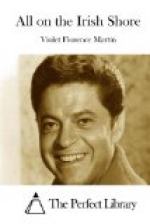* * * * *
Dinny Johnny won. It was a very close thing between him and Chantress, and that good hound’s valuable nose came near being caught as the gates clanged together, but Dinny Johnny was in first. Then he flung himself at the pack, whipping, slashing, and swearing like a madman, as indeed he was for the moment. He had often whipped for Mr. O’Grady, and the hounds knew him, but without the solid abetting of the wall and the gate, he would have had but a poor chance. As it was, he whipped them back into the field up which they had run, and as he did so, “Owld Sta’” came puffing up the hill, with about a dozen of the field hard at his heels.
“Poison!” gasped Dinny Johnny, falling down at full length on the grass, “the wood’s poisoned!”
When they went back to look for “Matchbox” she was still lying in the bohireen. Her bridle had vanished, and so had the pursuing countrymen. Mary O’Grady’s saddle was broken, and could never be used again, and no more could “Matchbox,” because she had broken her neck.
And so the hounds, whom she had saved, subsequently ate her; but one of her little hoofs commemorates her name, and as Mr. Denny, with its assistance, lights his after-dinner pipe, he often heaves an appropriate sigh, and remarks: “Well, Mary, we’ll never get the like of that pony again”.
“AS I WAS GOING TO BANDON FAIR”
The first glimpse was worthy the best traditions of an Irish horse-fair. The train moved slowly across a bridge; beneath it lay the principal street of Bandon, seething with horses, loud with voices, and as the engine-driver, with the stern humour of his kind, let loose the usual assortment of sounds, it seemed as though the roadway below boiled over. Horses reared, plunged and stampeded, while high above the head of a long-tailed chestnut a countryman floated forth into space, a vision, in its brief perfectness, delightfully photographed on the retina.
From the moment of leaving the railway station the fair was all pervading. It appeared that the whole district had turned horse dealer. The cramped side pavements of the town failed to accommodate the ceaseless promenade of those whose sole business lay in criticising the companion promenade of horses in the narrow street. They haled horses before them with the aplomb of a colonel of cavalry buying remounts.
“Hi! bay horse! Pull in here! Foxy mare! Hi, boy, bring up that foxy mare!”
The ensuing comments, though mainly of a damaging nature, were understood on both sides to be no more than conventional dismissals. The bay horse and the foxy mare were re-absorbed in the stream; their critics directed their attentions elsewhere with unquenched assiduity.
It is the truest, most changeless trait of Irish character, the desire to stand well with the horse, to be his confidant, his physician, his exponent. It is comparable to the inborn persuasion in the heart of every man that he is a judge of wine.




